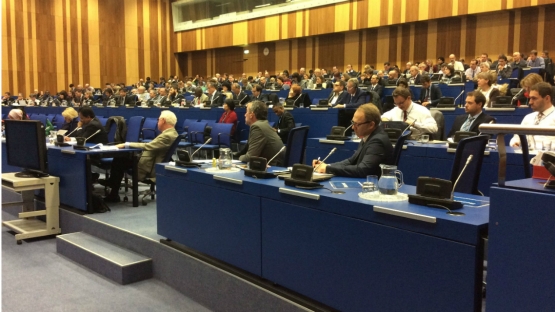An international conference held in Vienna in November concluded that the management of radioactive waste over the last 15 years has improved, and invited governments to devise national plans for the overall management of radioactive waste, including their storage and eventual disposal.
More than 270 participants from over 60 countries shared their views, knowledge and experience during the International Conference on the Safety of Radioactive Waste Management, held 16 years after the last comprehensive radioactive waste conference on the topic in Cordoba, Spain. During that time, the landscape for radioactive waste and spent fuel management has changed significantly, said Juan Carlos Lentijo, IAEA Deputy Director General and Head of the Department of Nuclear Safety and Security.
“It was important to review the progress achieved so far, identify the remaining challenges and discuss the means to address these challenges,” he said.
The five-day conference discussed national policies and strategies regarding radioactive waste management; waste processing; storage; disposal of low, intermediate and high-level waste, including spent fuel, disposal of disused radioactive sources and post-accident waste management.
The participants agreed that waste safety has improved across the board despite differences in national approaches.
“We have noticed progress in the overall management of all types of radioactive waste,” said Gerard Bruno, Head of the Radioactive Waste and Spent Fuel Management Unit at the IAEA. “While recognizing that some technical questions still need to be addressed, one can say that regulatory authorities and waste management companies have been able to demonstrate safety through the design, operation and licensing of facilities.”
While some criticized the slow progress in the establishment of high-level waste and spent fuel facilities, participants agreed that there was progress overall.
“The establishment of such facilities does take a long time, and we should allow them to take as long as they require,” Bruno said. “In the meantime, our understanding of long-term safety is improving.”
The conference also recognized waste storage as a necessary interim measure that can be done safely over reasonably defined periods of time. However, it emphasized the importance of disposal as the end goal that operators, regulators and policymakers should aim for.
“Disposal remains, in some cases, a complex and long process,” Bruno said. There is an expectation that Finland, Sweden and France will begin operations of their deep geological radioactive waste disposal facilities in coming years.
Dealing with radioactive sources
Participants also addressed issues facing Member States with relatively small radioactive waste inventories, such as disused sealed radioactive sources that result from medical or industrial use. They also discussed emergency cases and response methods to nuclear accidents and the management of post-accident scenarios.
The conference featured 45 presentation and 80 posters, as well as topical and plenary discussions.
“It was essential to host such a comprehensive conference at this point in time, especially when a number of countries are planning to design and operate deep geological disposal facilities for high-level radioactive waste and spent fuel while others are aiming to introduce nuclear energy and will need the knowhow to establish safe programmes,” Lentijo said.




